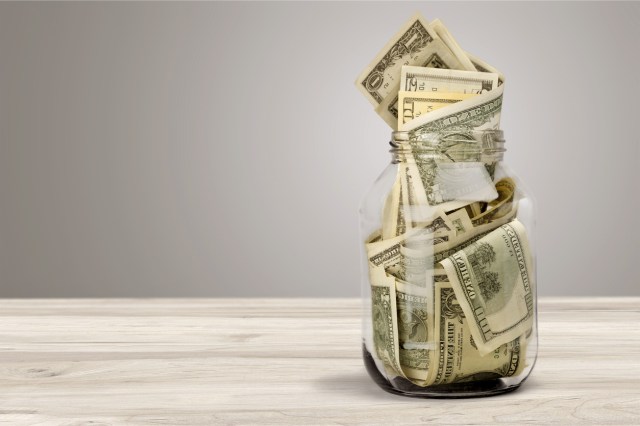We accept that some hotly debated topics will never lead to a consensus. Is Coke better than Pepsi? Should toilet paper be hung over or under? If dogs wore clothing, would the pants cover all four legs or just the hind two? But the issues are far more complicated and serious when it comes to the world of personal finance. One oft-debated question is whether to save money or pay off your debt first. It’s so important to save for retirement, and it’s also an absolute relief not to have any debt looming over your head. But if you had to choose between doing one or the other, here’s what you need to know.

Why You Should Pay Off Debt First
Financial advisors recommend paying off your debt before you start stashing away cash. If you don’t pay off your debt before due dates, you’re subject to high interest rates, which, depending on your exact contract, could amount to hundreds if not thousands of dollars in penalties accrued.
There are plenty of types of good and bad debt, but one of the worst is credit card debt. When it comes to interest rates, the national average for credit card debt is 27.94%, meaning if you don’t pay off the requisite balance before the time it’s due, those penalties add up. At the very least, you should always try to pay off the minimum amount on your credit card statement to avoid unnecessary fees. Paying off your balance on time also boosts your credit score, which is essential for taking out major loans before buying a house or vehicle.
The major drawback to paying off your debt first is, of course, the fact that it means less money to invest. But the brutal reality is that those high interest rates mean you’re on the hook for potentially a lot more than you would have saved or made in the market if you chose the latter option.

When You Should Save Money First
Despite the aforementioned arguments, there are still benefits to saving money before paying off your debt in some scenarios. This is especially true if the debt is minimal, the interest rates are low, or you have a loose deadline to pay those bills. In all of these cases, you may have the flexibility to invest your money and start generating compound interest.
The sooner you invest your money, the more cash you’ll generate over the years to live comfortably in retirement. Long-term investments also increase the odds of generating generational wealth, which allows you to provide for your children and their children even after you’re gone.
Plenty of low-risk investments will generate compound interest over time, turning a few thousand dollars into a six-figure amount if you can let your investment sit for long enough. This includes high-yield savings accounts, which can hover around 5% interest, certificates of deposit, and Treasury bonds, all of which are a safe way to invest your cash without worrying about the volatility of the stock market. That being said, these low-risk, long-term investments will rarely — if ever — make you enough money to recoup the penalties associated with financial debt unless you have an exceedingly low rate. If you want to invest in the market, a broad exchange-traded fund (ETF), could be a smart move. The average return is 10% per year, though of course nothing about that is guaranteed. Oft-recommended ETF options include VTI and VOO, both from Vanguard.
Reader Favorites

With enough foresight and attentiveness, there are ways to both pay off your debts and start saving ASAP. Take, for instance, a concept known as the 50/30/20 rule. This helpful budgeting trick may be the key to doing both. Essentially, this rule tells you to take 50% of your money and put it toward essential bills plus minimum monthly payments. Then take 30% of your money and use that for personal hobbies, vacations, and other wants rather than needs. The final 20% should be allocated toward personal savings and paying off more than the minimum monthly amount for any outstanding debts. That last sentence is the key to all of it though. If you aren’t hitting your monthly minimums and start accruing penalties, those “savings” will vanish as you pay of your added debt.
More From Our Network
Better Report is part of Inbox Studio, an email-first media company. *Indicates a third-party property.

















